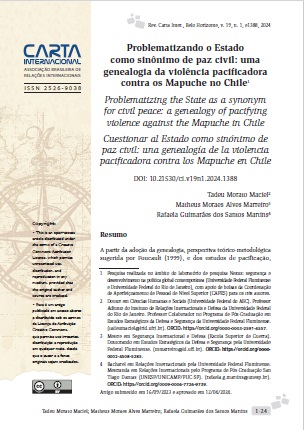Problematizing the State as a synonym for civil peace
a genealogy of pacifying violence against the Mapuche in Chile
DOI:
https://doi.org/10.21530/ci.v19n1.2024.1388Keywords:
Mapuche, Chile, Pacification, Violence, Civil PeaceAbstract
From the adoption of genealogy, a theoretical-methodological perspective suggested by
Foucault (1999), and pacification studies, three emergencies of repressive processes against
Mapuche indigenous people in Chile are analyzed: the “pacification of Araucania” (1852-
1883), the Pinochet dictatorship (1973-1990) and the violence suffered by this population
in the post-redemocratization period (1990-). It is argued that the relationship between
the Chilean State and the Mapuche indigenous people, from the formation of the State to
contemporary times, is marked by practices of pacifying violence. The persistence of such
practices, although emerging in different ways over time, challenges a conception of the
State as synonymous with civil peace.
Downloads

Published
How to Cite
Issue
Section
License
Copyright (c) 2024 Tadeu Morato Maciel, Matheus Moraes Alves Marreiro, Rafaela Guimarães dos Santos Martins

This work is licensed under a Creative Commons Attribution 4.0 International License.
Authors who publish with this journal agree to the following terms:
- Authors retain copyright and grant the journal right of first publication with the work simultaneously licensed under a Creative Commons Atribuição 4.0 Internacional that allows others to share the work with an acknowledgement of the work's authorship and initial publication in this journal.
- Authors are able to enter into separate, additional contractual arrangements for the non-exclusive distribution of the journal's published version of the work (post it to an institutional repository or publish it in a book, for example), with an acknowledgement of its initial publication in this journal.


